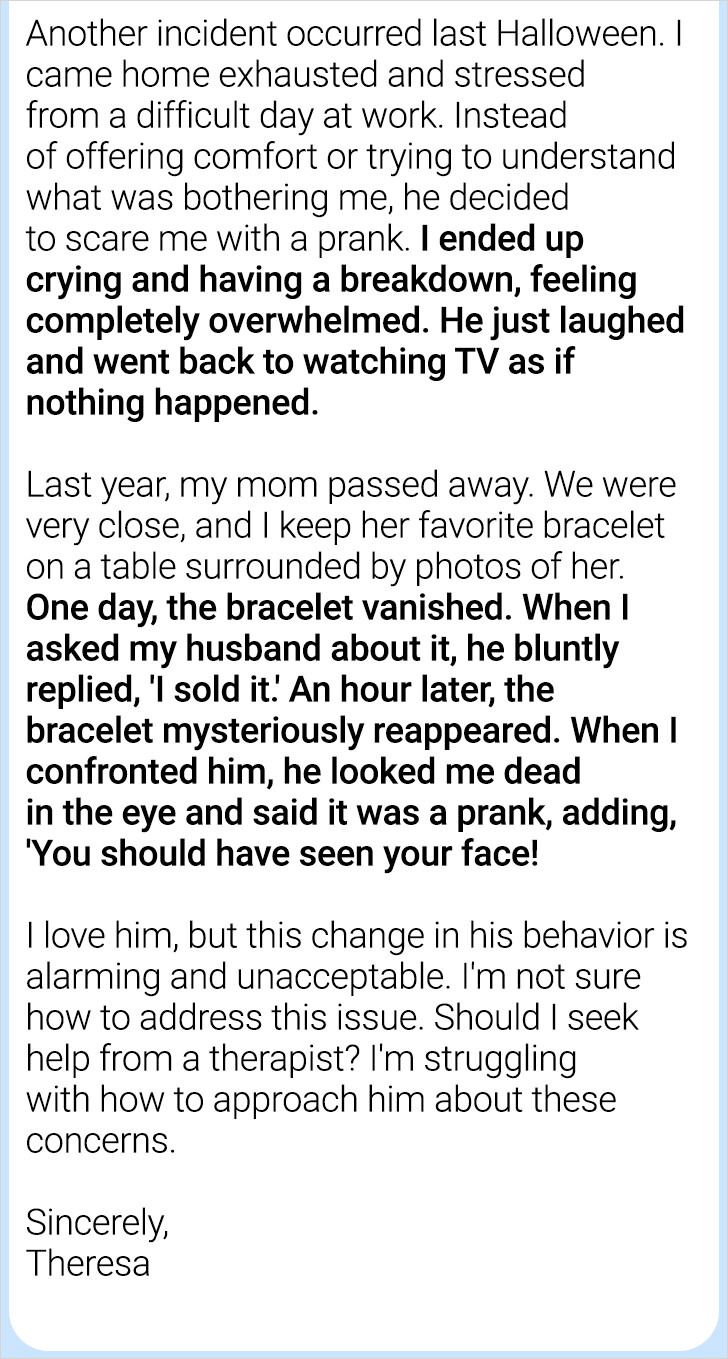
In a marriage, trust, respect, and support are essential for building a strong bond. However, sometimes these elements may be lacking, which can lead to instability and tension. Such issues can arise from insecurities, power struggles, or mental health challenges. Recently, one of our Bright Side readers sent us a heartfelt letter, seeking guidance about her husband’s troubling behavior.


© cottonbro studio / Pexels


© katemangostar / freepik
Thank you, Theresa, for trusting us with the concerns you’re experiencing with your husband. We’ve put together five pieces of advice to help you navigate this challenging time.
Communication is Key
It’s important to approach your husband with openness and honesty. Find a quiet moment to express how his recent actions have made you feel, without accusing or blaming. Use “I” statements, such as “I felt hurt when…” to avoid making him defensive.
Be clear about what you need from him moving forward, whether it’s more empathy, understanding, or simply a cessation of hurtful pranks. Remember, the goal is to reconnect and rebuild trust, so focus on finding a way forward together.
Setting Boundaries
In any relationship, it’s crucial to establish clear boundaries that both partners respect. Reflect on what behaviors are unacceptable to you and communicate these boundaries to your husband. Explain that while humor and jokes can be part of a relationship, there’s a line that shouldn’t be crossed, especially when it comes to sensitive topics like loss and personal belongings.
Be firm in your expectations, and make it clear that respect and kindness are non-negotiable. This conversation may be difficult, but it’s a necessary step in ensuring your emotional well-being.
Seeking Professional Guidance

© master1305 / Freepik
Given the significant changes in your husband’s behavior, consider involving a professional therapist. A therapist can provide a neutral space for both of you to express your feelings and concerns. They can also offer strategies for improving communication and understanding each other’s perspectives.
Suggesting couples therapy doesn’t mean your relationship is failing; rather, it shows a commitment to making it stronger. Sometimes, an outside perspective can shed light on underlying issues that may not be immediately apparent.
Fostering Empathy and Connection
Try to reestablish emotional intimacy by engaging in activities that foster empathy and understanding. Spend quality time together, doing things you both enjoy, or exploring new interests. Encourage conversations about deeper topics, such as your feelings, dreams, and fears.
This can help both of you reconnect on an emotional level and potentially reveal the reasons behind his recent behavior. By creating a safe space for vulnerability, you may find that these issues can be addressed more compassionately.
Self-Care and Personal Reflection

While navigating this challenging period, prioritize your own mental and emotional health. Take time for self-care activities that make you feel centered and supported, whether it’s through hobbies, exercise, or spending time with supportive friends and family. Reflect on your own needs and boundaries, and consider journaling or meditating to process your emotions.
Understanding your own feelings and values will empower you to make informed decisions about your relationship. Remember, your well-being is just as important as the relationship itself.
In a different scenario, a wife shared her distress about her controlling husband’s sudden imposition of a strict new rule, which left her both shocked and utterly worried. You can read her letter here.